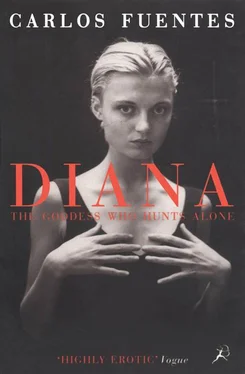Carlos Fuentes - Diana the Goddess Who Hunts Alone
Здесь есть возможность читать онлайн «Carlos Fuentes - Diana the Goddess Who Hunts Alone» весь текст электронной книги совершенно бесплатно (целиком полную версию без сокращений). В некоторых случаях можно слушать аудио, скачать через торрент в формате fb2 и присутствует краткое содержание. Год выпуска: 2012, Издательство: Bloomsbury UK, Жанр: Современная проза, на английском языке. Описание произведения, (предисловие) а так же отзывы посетителей доступны на портале библиотеки ЛибКат.
- Название:Diana the Goddess Who Hunts Alone
- Автор:
- Издательство:Bloomsbury UK
- Жанр:
- Год:2012
- ISBN:нет данных
- Рейтинг книги:3 / 5. Голосов: 1
-
Избранное:Добавить в избранное
- Отзывы:
-
Ваша оценка:
- 60
- 1
- 2
- 3
- 4
- 5
Diana the Goddess Who Hunts Alone: краткое содержание, описание и аннотация
Предлагаем к чтению аннотацию, описание, краткое содержание или предисловие (зависит от того, что написал сам автор книги «Diana the Goddess Who Hunts Alone»). Если вы не нашли необходимую информацию о книге — напишите в комментариях, мы постараемся отыскать её.
Diana the Goddess Who Hunts Alone — читать онлайн бесплатно полную книгу (весь текст) целиком
Ниже представлен текст книги, разбитый по страницам. Система сохранения места последней прочитанной страницы, позволяет с удобством читать онлайн бесплатно книгу «Diana the Goddess Who Hunts Alone», без необходимости каждый раз заново искать на чём Вы остановились. Поставьте закладку, и сможете в любой момент перейти на страницу, на которой закончили чтение.
Интервал:
Закладка:
The raccoon abounds in the hills, bluffs, and plains of Iowa, a state of fertile black soil, of immense pasturelands that have been composting for millions of years. The boys spent the week working at tasks that were sometimes pleasant, sometimes disagreeable. Math is too abstract, geography too concrete, too alien. Who cares where Mexico is, or Senegal or Manchuria? Who lives there? Does anyone live there? Sure: dagos, chinks, kikes, niggers, and spicks. Have you ever seen anyone from there? The drugstore, on the other hand, is the place for dates; love begins over a shared cherry Coke with two straws, as in the Andy Hardy films, and continues at the movies on Saturday night, when sweaty hands are linked in love and popcorn is consumed while on the screen the lovers see themselves live as they are in their seats, looking at Mickey Rooney and Ann Rutherford holding hands, looking at two imaginary kids holding hands, looking at …
“There’d be basketball games at the gym. Don’t miss them. They’re easy to imagine. They never change.”
History class was the most boring. It always took place “before,” in a kind of eternal museum where everything was dead, where there were no people like them except when they were translated to the screen and turned into Clark Gable and Vivien Leigh. That was history, even if it was a lie. Reality could be an illusion — drinking a chocolate malted with your girlfriend, going to the movie to see a new illusion each week. They all knew they’d get married right there and would live right there, and since most of them were good boys, they’d be good husbands, good fathers, and would resign themselves to the aging of their girlfriends — too much flaccid flesh, the death of sex, the death of romance, romance, romance, like the moon going dark forever.
On the other hand, a group of young men hunting raccoons vibrates with a single emotion, like nothing else. Their rifles were obvious extensions of their masculinity, and they showed them, cleaned them, loaded them as if they were showing one another their phalluses, as if acts barely insinuated in the locker room were authorized in the raccoon hunt by those rifles so easy to buy in a country where the right to keep and bear arms is sacred — it’s in the Constitution.
“Go back to the high school for a minute, please …”
It was as if the dogs were blind, their huge floppy ears given over to their single sense, smell. Blind, deaf, plagued with blue ticks, which the boys would amuse themselves by pulling off after hunting and a few beers around the fire.
“It’s a building from the fifties, modern, low …”
Sometimes, when they lost the scent, the dogs would wander off, blind, deaf. All one had to do then was to leave the owner’s jacket out on the plain, and the dog would invariably return. This was the real world. This was the admirable, fixed, concrete, intelligible world. In which a dog would come back to the spot where his owner’s jacket was. The boys hugged one another, laughing and drinking, elbowing one another in the ribs the same way they snapped towels at one another in the locker room, scrupulously refusing to look too low. The rifles were enough; you could stare at a rifle. You could touch your buddy’s rifle. Together, they could skin raccoons around the fire and go back to town with their bloody trophies and their deaf dogs.
“There’s an auditorium in one wing of the building … You have to visit it.”
One of the boys was different. Hunting raccoons and skinning seemed pointless to him. People used to go to football games in raccoon coats. No more. Hunters in the Wild West used to make themselves raccoon caps. No more. Once upon a time, there were men here, real men. You had to be a real man to hunt what there used to be in Iowa. Buffalo, nothing less.
“He gave me a nickel with a buffalo on one side and an Indian on the other. I still have it. He told me to take care of it, it was rare. First the buffalo disappeared, then the Indians, and then the coin with their picture. Now on one side there is a distinguished gentleman, the untouchable American saint Thomas Jefferson, and on the other his house, Monticello.”
Who killed the last buffalo? that boy asked Diana. This land was full of buffalo. Who, who killed the last one …?
In the United States, telephone poles are now metal. Here, they are still made from trees. It’s as if the wires couldn’t speak without the voices of the forest. The night I spent in Diana’s town thinking about her was a dark night, and in my hotel room with the window open, I felt like one of those blind hunting dogs, blinded by the darkness; but even if I had no sense of smell, I did have my ears at the ready to hear what the silence was saying beyond the darkness. Would they talk about her? Would they remember how one day her father took her to the plane for Los Angeles, a seventeen-year-old girl with long chestnut hair, and how she came back one day in a Cadillac convertible, wrapped in a mink but with her hair cut short like an army recruit’s, as blond as a … star? That’s how they showed her off on Main Street, between the drugstore and the shoe store, the courthouse and the high school.
“Come to the auditorium. Wait till the moon comes up. Let’s wait a while. You’re going to lift my skirt. You’re going to caress my mound. You’re going to take off my panties. When the moon comes up, you’re going to take my virginity.”
She was the girl next door, same as the others except for those unique, incomparable gray eyes (or were they blue?). I don’t know if those eyes of Diana’s could live forever looking at themselves in the blue eyes of her parents, relatives, and friends. I looked at the eyes of the old people in Iowa, and once again I was surprised at the simplicity, the goodness, the recaptured, eternal childhood of those eyes, even when the hair above was white as Christmas and the faces as wrinkled as the map where the buffalo once roamed. Were these men, white and soft as marshmallows, the same cruel, insensitive boys who went out on Saturdays to hunt raccoons? Were they the same men who, full of blood lust and unsatisfied violence, went out to kill the last buffalo?
“Now, screw me now, when the moonlight comes through the skylight, screw me, Luke, screw me like the first time, give me the same pleasure, make me tremble the same way, my love, my love …”
When the moon came up that night in Iowa and I saw it from the window of the Howard Johnson’s, I was convinced that Luke, wherever he was and whoever he was now, had cut it out and ordered it hung in the sky. In her honor. It was her paper moon.
The sun rose on the Sunday when I was to leave, and I remembered that she’d told me, Don’t miss going to church and listening to the sermon.
Whenever I go to a Protestant church, I’m a bit afraid. It’s not mine, and the absence of decoration makes me fear an essential hypocrisy that deprives God of His baroque glory and keeps the faithful from sharing it, all in exchange for a white Puritanism that is only painted white, like the sepulchers of the Pharisees, rendered white the better to cast the sins of the world on the rest, those who are different, the others.
The pastor ascended the pulpit, and I stupidly tried to give that role to a famous actor — Orson Welles in Moby-Dick, Spencer Tracy in San Francisco, Bing Crosby in The Bells of Saint Mary’s, or Frank Sinatra in The Miracle of the Bells. I surprised myself by laughing softly as I remembered Hollywood’s extravagant imagination in creating priests who were boxers, singers, or Falstaff types … No. This little man with white hair and a hatchet face was almost a human Host, colorless, as white as celestial flour.
It took me some time to perceive the carbonic heat of his eyes, like black marbles. And his voice did not seem to emanate from him; fascinated, I began to think his voice was only a conduit for another voice, distant, eternal, that described the Lutheran faith, that let us have radical confidence in God because God justifies man, God accepts man because man accepts that he is accepted despite his being unacceptable. How can man have faith in God’s acceptance of all the sins that all individuals, even the cleanest, hide in their heart of hearts and excrete into the material world? Man, in faith, believes he is received by the grace of God and that his crimes are pardoned in the name of Christ, who with His death paid for all our sins. The price the church puts on such a faith is that of obeying within and without the will of God. That requires faith, not reason, because reason leads to despair. It’s hard to conceive rationally that God justifies the unjust. The believer embraces the Gospel in order to understand that gospel means that God justifies believers in the name of Christ, not in the name of their merits. That is what you should understand perfectly this Sunday. You should believe that God pardons because He is just, not because you are. You will never be able to accumulate enough merit to be pardoned for torturing a fly or disdainfully stepping on an ant. You erroneously think God is just.
Читать дальшеИнтервал:
Закладка:
Похожие книги на «Diana the Goddess Who Hunts Alone»
Представляем Вашему вниманию похожие книги на «Diana the Goddess Who Hunts Alone» списком для выбора. Мы отобрали схожую по названию и смыслу литературу в надежде предоставить читателям больше вариантов отыскать новые, интересные, ещё непрочитанные произведения.
Обсуждение, отзывы о книге «Diana the Goddess Who Hunts Alone» и просто собственные мнения читателей. Оставьте ваши комментарии, напишите, что Вы думаете о произведении, его смысле или главных героях. Укажите что конкретно понравилось, а что нет, и почему Вы так считаете.












